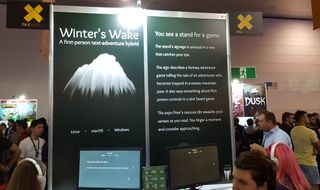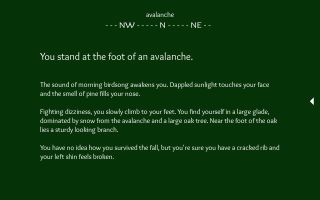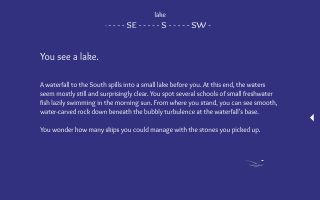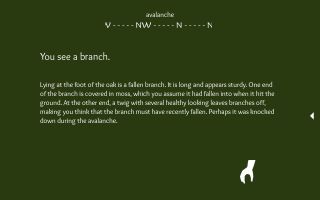How first-person text adventure Winter's Wake drew crowds at PAX
You see an article about a text adventure. It sounds interesting, and you consider reading more.

Given the task of convincing people to play a text adventure at PAX while surrounded by flashier games with modern innovations like graphics, Josh 'Cheeseness' Bush made a booth that drew you in the way text adventures do: with writing. He even had business cards and a t-shirt printed that continued the theme—"You see a developer. He looks tired but eager to tell you about his game."
Winter's Wake isn't an ordinary text adventure. Like most in the genre it's written in the second-person ("You are likely to be eaten by a grue"), but Winter's Wake is also a first-person game with mouselook. Or controller-look. Instead of typing "examine left door" you can just look in that direction and a description of what's to your left will appear in front of you. The same happens if you look up or down. Rather than typing commands you click on paragraphs that can be interacted with—walking in that direction, talking to that character, picking up that item—but it still manages to have puzzles you'll have to think about.
Mostly though, what it's about is presence. While climbing a snowy mountain, meandering through a sun-dappled forest, or hanging out in a healer's hut, I felt like I was there in spite of the lack of graphics. It helps that Winter's Wake has positional audio, and when you turn your head to look in the direction of the waterfall you can hear it as well as see text about it, but those evocative words do as much of the work.

PC Gamer: Someone told me it's best if you go into Winter's Wake blind.
Josh Bush: I would agree with that. I say that you are an adventurer who becomes trapped in a snowy mountain pass, I think that's about as much going in as I'd like people to have. You do end up with a quest that you have to fulfill and I think eventually I'd like players to think about what that means, why they've done it, and reflect on that sort of stuff.
What was the inspiration?
I was participating in 7-Day FPS which is a game jam. Seven days, make an FPS game. The last one was in 2014 and I thought, "I'm going to do something different this year. What would a VR-friendly text adventure look like?" This is what I came up with.
The biggest gaming news, reviews and hardware deals
Keep up to date with the most important stories and the best deals, as picked by the PC Gamer team.
VR was the initial idea, but now people can play without VR?
It does have VR support, it's just a little bit rough. I find that people are less tolerant of work-in-progress VR experiences so I'd rather give people a good first impression than a rough one, but I also want to make sure it's totally accessible without that, so it's got mouse support, keyboard support, gamepad support. Whatever your control scheme is I can probably support it.

In classic text adventures there's a lot of times when you're in a dark passageway and it's like, do you want to go left or do you want to go right? That's not normally an interesting decision. Left and right don't really mean anything to you in that moment, but in this they do.
There is a 3D environment around you and there's positional audio, so when you turn your head to look in a particular direction you might hear sounds coming from wherever that exit is going to lead. When you look in the other direction you'll hear those things pan around behind you and you'll hear other things pan around to in front of you. I really wanted to do something where people feel like they have a sense of presence within the space.
I have analytical logs from players' playthroughs and I found that there are particular scenes that players tend to just linger in. I work out what order they look at things, how long do they look at things for, and it often seems like people go to the lake scene and just hang out. It's really interesting to see people linger in a scene without a purpose.
Is the audio part of the puzzles as well?
I try to use it as an orientation cue and sometimes a positional cue for objects that you need to interact with. I feel like it supports the puzzles, but I don't have anything at the moment where audio plays an active role in the puzzles. But maybe I could do something like that.

So tell me about the puzzles. You have an inventory as well, so you've got items and you can use them on things you find. Is it those kind of puzzles?
At the moment it automatically uses an inventory item if it makes sense to use it for a puzzle. In that regard inventory is cosmetic. It's a way that as a designer I can give feedback to the player about what it is that they've done, what it is that they're doing.
Is it possible to get in a failure state? Can you die?
Not in this game. I'm adhering to Ron Gilbert's mantra of no dead ends, no deaths, but I have made several other games with the same engine. It's my own engine and I have other projects to test the tools on, which is a good thing for me to iterate upon, and most recently i made a game called The Spicy Meatball Saves the Day which is a superhero adventure. You're on your way back from fighting crime, you stop to rescue some people from a burning building, and in that one you can die.
What are your future plans for the engine? Do you want other people to be able to make their own games in it?
Eventually I would like to make it available for other people to make similar experiences, yeah.
Winter's Wake should be available in 2018. You can play an earlier version of the demo at itch.io.

Jody's first computer was a Commodore 64, so he remembers having to use a code wheel to play Pool of Radiance. A former music journalist who interviewed everyone from Giorgio Moroder to Trent Reznor, Jody also co-hosted Australia's first radio show about videogames, Zed Games. He's written for Rock Paper Shotgun, The Big Issue, GamesRadar, Zam, Glixel, Five Out of Ten Magazine, and Playboy.com, whose cheques with the bunny logo made for fun conversations at the bank. Jody's first article for PC Gamer was about the audio of Alien Isolation, published in 2015, and since then he's written about why Silent Hill belongs on PC, why Recettear: An Item Shop's Tale is the best fantasy shopkeeper tycoon game, and how weird Lost Ark can get. Jody edited PC Gamer Indie from 2017 to 2018, and he eventually lived up to his promise to play every Warhammer videogame.
Most Popular

